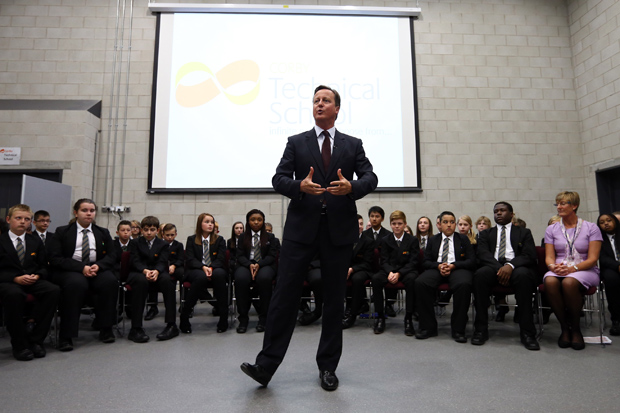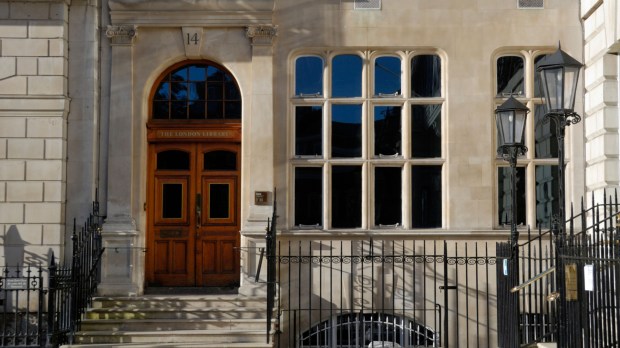In 2000, the then Chancellor of the Exchequer, Gordon Brown, accused Magdalen College, Oxford, of class bias in failing to admit a student called Laura Spence, a pupil at a Tyneside comprehensive. This was grossly unfair — how could the Chancellor know the details of a particular case? It was also outrageous in principle: why should a politician tell a university whom to admit? This Sunday, David Cameron did much the same thing. In the middle of his EU negotiations, the migrant crisis and the other genuinely important things the Prime Minister must deal with, he found time to offer an article to the Sunday Times, headlined ‘Watch out, universities; I’m bringing the fight for equality to you’. He attacked his own university, Oxford, for admitting only 27 black men and women in 2014, and said he wants to legislate ‘to place a new transparency duty on universities to publish data routinely about the people who apply to their institution… and who gets offered a place.’ This ‘will include a full breakdown of their gender, ethnicity and socioeconomic background’. Why? Why does a Conservative Prime Minister want, like apartheid South Africa, to classify people according to race, and, like a state socialist, to engineer the composition of free institutions? Why does he, who benefited so much from Oxford, unjustly insult it? Why does he question the motives of one of the few British institutions which the world still recognises as outstanding? What is the cultural rottenness, the mental cowardice which leads this well-educated, moderate man to assail the glories of his own country? Almost nothing depresses me more than this weird urge to foment a cultural civil war which no one needs.
Last week, I was in the United States, where the media are even more subject to groupthink than their British equivalents. Fox News, supposedly the conservative voice, is really much more conformist than it pretends, and specialises in noisy opinion more than real news. The only person I met who got the Republican caucuses absolutely right was Chris Ruddy, founder and CEO of Newsmax, the conservative cable channel which claims to be in ‘42 million US homes’. He told me he thought Cruz would beat Trump and the real winner would be Marco Rubio. So it proves. It is interesting that in a campaign in which all the candidates shout about the glories of America, Rubio is the only one who fastens on its global role: ‘If America declines, there is nothing in the world to take its place.’ He is right: we already see the consequences of that decline.
A freedom-of-information request by Sikhs has turned up some curious statistics from the Metropolitan Police. They show that of the more than 400 ‘Islamophobic hate crimes’ recorded in the first half of last year, 28 per cent were not attacks on Muslims at all. They were either attacks on people thought to be Muslims (often Sikhs) or attacks classified as Islamophobic because of the absurd criteria (invented by the Macpherson Report on the death of Stephen Lawrence) which define such incidents as ‘any offence which is perceived to be Islamophobic by the victim or any other person’. Muslim bodies attracting government grants obviously have an interest in there being as many such incidents as possible, so that ‘perception’ tends to extend well beyond reality. If we must have all these phobias, why not Sikhophobia and, indeed, Christianophobia? Collection of these numbers would lead to the arrest of a lot of Muslims, so I suppose it is ruled out as being Islamophobic.
The obituaries of George Weidenfeld, who died last week, missed his sense of humour. One of his gifts was mimicry. When he worked for the BBC during the war, he was well-known in the canteen for his uncanny ability to reproduce, in their original language and accent, the speeches of Hitler. Each week at that time, the BBC broadcast a programme called The Shadow of the Swastika, which played some of Hitler’s gems. George’s friend Miriam Gross records that one day the expected tape of the latest oration failed to arrive. Someone remembered George’s gift, got him into the studio, and made him invent and deliver a tirade by the Führer, which was broadcast as the real thing.
The firm of Weidenfeld and Nicolson was satirised as Snipcock and Tweed by Private Eye. The joke was slightly anti-Semitic, but it captured the combination which dominated English culture after the second world war. Snipcock brought the energy and intellectuality; Tweed contributed the English ironies and opened the doors. Something similar applied in many fields: the Tory party had Keith Joseph and Willie Whitelaw; the opera combined Claus Moser and Lord Drogheda. Harold Nicolson, -pre-war in attitude, did not like Weidenfeld’s Jewishness, but his son Nigel, partly in reaction, welcomed George, and formed their publishing partnership in 1948. Nigel’s son Adam tells me that Nigel was dismayed by George’s ‘sexual confidence’ and dynamism which made him feel ‘shy and hopeless’, but was proud to have played his part in creating a more exciting and less insular culture. The combination worked. Nowadays, both the Snipcock and the Tweed elements in Britain have weakened, to our detriment.
The story goes that George, who was famous for commissioning books from famous people, once said to his secretary, ‘Please get me Mrs Williams on the phone.’ He was put through to Shirley, who agreed to write, for a vast sum, a very dull book (I know: I have read it) called Politics is for People. George had commissioned her out of politeness. His secretary had got the wrong Mrs Williams. He had actually been looking for Marcia Williams (Lady Falkender), the celebrated former head of Harold Wilson’s political office, who, as George well knew, was a lot spicier. She duly wrote Downing Street in Perspective, also for George.
Got something to add? Join the discussion and comment below.
Get 10 issues for just $10
Subscribe to The Spectator Australia today for the next 10 magazine issues, plus full online access, for just $10.
You might disagree with half of it, but you’ll enjoy reading all of it. Try your first month for free, then just $2 a week for the remainder of your first year.















Comments
Don't miss out
Join the conversation with other Spectator Australia readers. Subscribe to leave a comment.
SUBSCRIBEAlready a subscriber? Log in